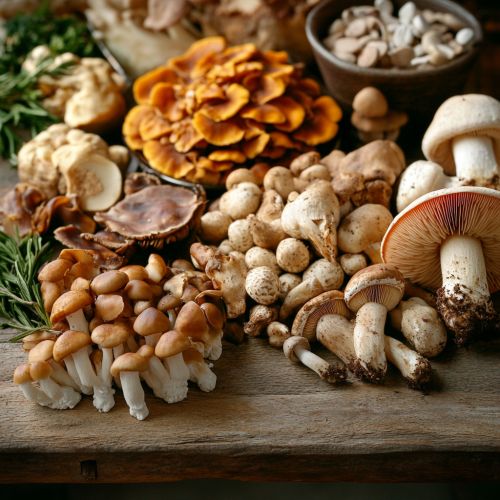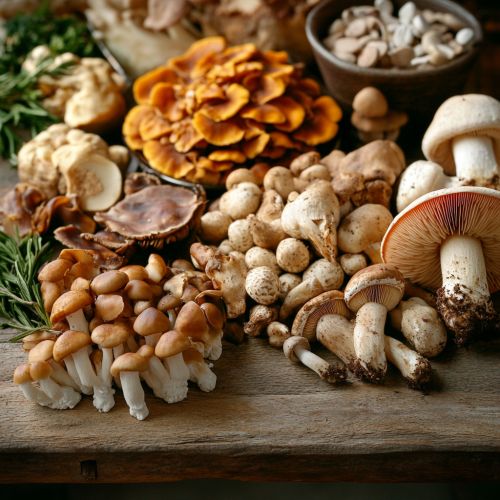Medicinal mushrooms
Introduction
Medicinal mushrooms have been utilized in traditional medicine for centuries, particularly in Asian cultures. These fungi are renowned for their potential health benefits, including immune system support, anti-inflammatory properties, and potential anti-cancer effects. This article delves into the various types of medicinal mushrooms, their bioactive compounds, and their potential therapeutic applications.
Types of Medicinal Mushrooms
Reishi (Ganoderma lucidum)
Reishi mushrooms, also known as Lingzhi, are one of the most well-known medicinal mushrooms. They have been used in traditional Chinese medicine for over 2,000 years. Reishi is believed to enhance the immune system, reduce stress, improve sleep, and lessen fatigue. The primary bioactive compounds in Reishi include polysaccharides, triterpenoids, and peptidoglycans.
Shiitake (Lentinula edodes)
Shiitake mushrooms are not only a popular culinary ingredient but also possess medicinal properties. They contain lentinan, a polysaccharide that has been shown to boost the immune system and exhibit anti-tumor activity. Shiitake mushrooms are also rich in vitamins, minerals, and amino acids, contributing to their health benefits.
Maitake (Grifola frondosa)
Maitake, also known as "hen of the woods," is another mushroom with significant medicinal properties. It contains beta-glucans, which are known to enhance immune function and may help regulate blood sugar levels. Maitake is also studied for its potential anti-cancer properties.
Turkey Tail (Trametes versicolor)
Turkey Tail mushrooms are recognized for their distinctive fan-shaped appearance and potent medicinal properties. They contain polysaccharide-K (PSK) and polysaccharide-peptide (PSP), both of which have been studied for their immune-boosting and anti-cancer effects. Turkey Tail is commonly used as an adjunct therapy in cancer treatment.
Chaga (Inonotus obliquus)
Chaga mushrooms grow primarily on birch trees in cold climates. They are rich in antioxidants, particularly melanin, which gives them their dark color. Chaga is believed to support immune function, reduce inflammation, and protect against oxidative stress. It is also studied for its potential anti-cancer properties.
Cordyceps (Cordyceps sinensis)
Cordyceps is a parasitic fungus that grows on the larvae of insects. It has been used in traditional Chinese medicine to enhance energy, stamina, and athletic performance. Cordyceps contains cordycepin, a compound that exhibits anti-inflammatory, anti-tumor, and anti-oxidative properties.
Lion's Mane (Hericium erinaceus)
Lion's Mane mushrooms are known for their unique appearance, resembling a lion's mane. They contain hericenones and erinacines, compounds that stimulate nerve growth factor (NGF) production. Lion's Mane is studied for its potential neuroprotective effects, including the promotion of cognitive function and the reduction of symptoms in neurodegenerative diseases.


Bioactive Compounds
Medicinal mushrooms contain a variety of bioactive compounds that contribute to their therapeutic effects. These compounds include polysaccharides, triterpenoids, phenolic compounds, and sterols. Polysaccharides, particularly beta-glucans, are known for their immune-modulating properties. Triterpenoids exhibit anti-inflammatory and anti-tumor activities. Phenolic compounds and sterols contribute to the antioxidant and anti-inflammatory effects of these mushrooms.
Therapeutic Applications
Immune System Support
Medicinal mushrooms are widely recognized for their ability to modulate the immune system. Beta-glucans, found in many medicinal mushrooms, activate immune cells such as macrophages, natural killer cells, and T-cells. This activation enhances the body's ability to fight infections and diseases. Mushrooms like Reishi, Shiitake, and Turkey Tail are particularly noted for their immune-boosting properties.
Anti-Cancer Properties
Several medicinal mushrooms have been studied for their potential anti-cancer effects. Compounds such as PSK and PSP from Turkey Tail, lentinan from Shiitake, and triterpenoids from Reishi have shown promise in inhibiting tumor growth and enhancing the efficacy of conventional cancer treatments. These mushrooms are often used as adjunct therapies to support patients undergoing chemotherapy or radiation.
Anti-Inflammatory Effects
Chronic inflammation is linked to various diseases, including cardiovascular disease, diabetes, and cancer. Medicinal mushrooms such as Reishi, Chaga, and Cordyceps contain compounds that exhibit anti-inflammatory properties. These mushrooms may help reduce inflammation and mitigate the risk of chronic diseases.
Antioxidant Activity
Oxidative stress is a major contributor to aging and various diseases. Medicinal mushrooms are rich in antioxidants, which help neutralize free radicals and protect cells from damage. Chaga, in particular, is noted for its high antioxidant content, including melanin and superoxide dismutase (SOD).
Neuroprotective Effects
Lion's Mane mushrooms are of particular interest for their potential neuroprotective effects. The hericenones and erinacines in Lion's Mane stimulate the production of nerve growth factor (NGF), which is essential for the growth, maintenance, and survival of neurons. This makes Lion's Mane a promising candidate for supporting cognitive function and potentially treating neurodegenerative diseases such as Alzheimer's and Parkinson's.
Traditional and Modern Uses
Medicinal mushrooms have been used in traditional medicine systems for centuries. In traditional Chinese medicine, mushrooms like Reishi and Cordyceps are used to tonify the body, enhance longevity, and treat various ailments. In modern times, medicinal mushrooms are available in various forms, including extracts, powders, capsules, and teas. They are used as dietary supplements to support overall health and well-being.
Safety and Side Effects
While medicinal mushrooms are generally considered safe for most people, it is important to use them with caution, especially for individuals with allergies or underlying health conditions. Some mushrooms may interact with medications or cause allergic reactions. It is advisable to consult with a healthcare provider before incorporating medicinal mushrooms into one's regimen.
Research and Future Directions
The therapeutic potential of medicinal mushrooms is an active area of research. Studies are ongoing to further elucidate the mechanisms of action of various bioactive compounds and to explore new therapeutic applications. Advances in biotechnology and molecular biology are expected to enhance the understanding and utilization of medicinal mushrooms in the future.
